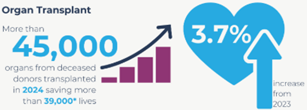
Home / The Science
New Research Confirms CMS Metrics Measure Demographics, Not Performance
A new study published in the January 2026 issue of Transplantation by Dr. James R. Rodrigue and colleagues provides compelling evidence that CMS’s OPO performance metric is fundamentally flawed.
What You Need To Know
-
Donation by the Numbers
According to the official data from the Organ Procurement and Transplantation Network more organ transplants occurred in the United States in 2024 than …
-
The Facts on Donation and Transplant
Misinformation and ad hominem attacks on the non-profit organ donation system continue and demand with even more …
-
Peer-Reviewed Science
This series of expert-curated Peer Reviewed Science Continues to Show Major Flaws in CMS Governing Rule and related policy and rule making …
-
CMS Final Rule’s Bias Against Large OPOs Puts Patients At Risk
An evidenced based study published in American …
Peer-Reviewed Science and Data
Misinformation and ad hominem attacks on the non-profit organ donation system continue and demand with even more urgency that true peer-reviewed science, and not special interest politics, be the guiding principle to achieve greater effectiveness in the donation and transplant ecosystem.
More on The Science
-

Donation by the Numbers
Studies have shown that nearly 30% of recovered kidneys were discarded because transplant centers would not use them. The system must work together to increase utilization as America’s leading transplant surgeons, including SID&T board members advocate …
-

Bureaucracy Failing Patients
In 2024 12,000 potentially life-saving organs were discarded in the United States. OPOs made more than 26 million attempts to place these rare gifts with transplant centers before they are ultimately discarded as medical waste …
CMS Final Rule’s Bias Against Large OPOs Puts Patients At Risk
An evidenced based study published in American Journal of Transplantation proved larger OPOs are “systematically and disproportionately vulnerable to decertification independent of actual performance” …


